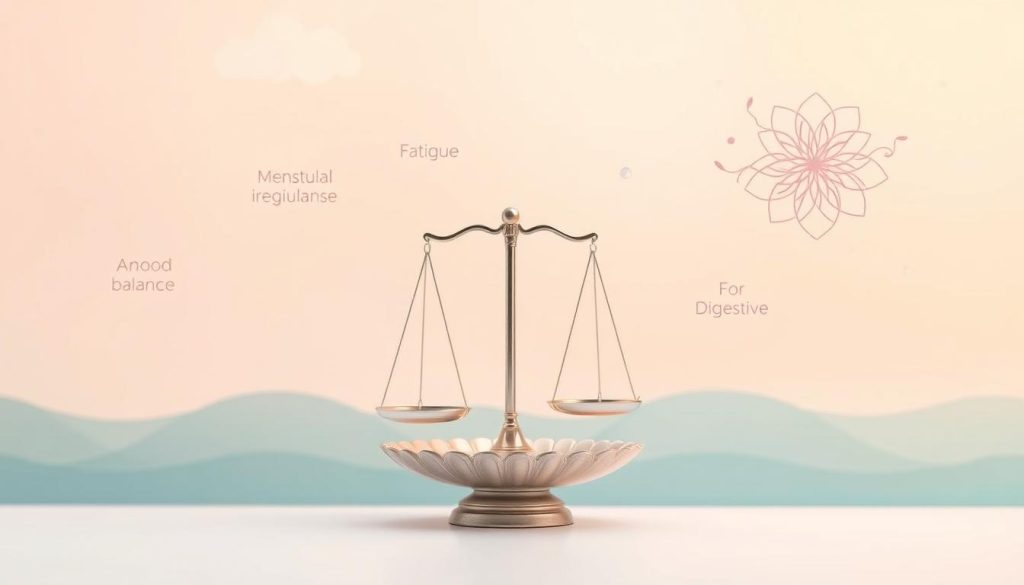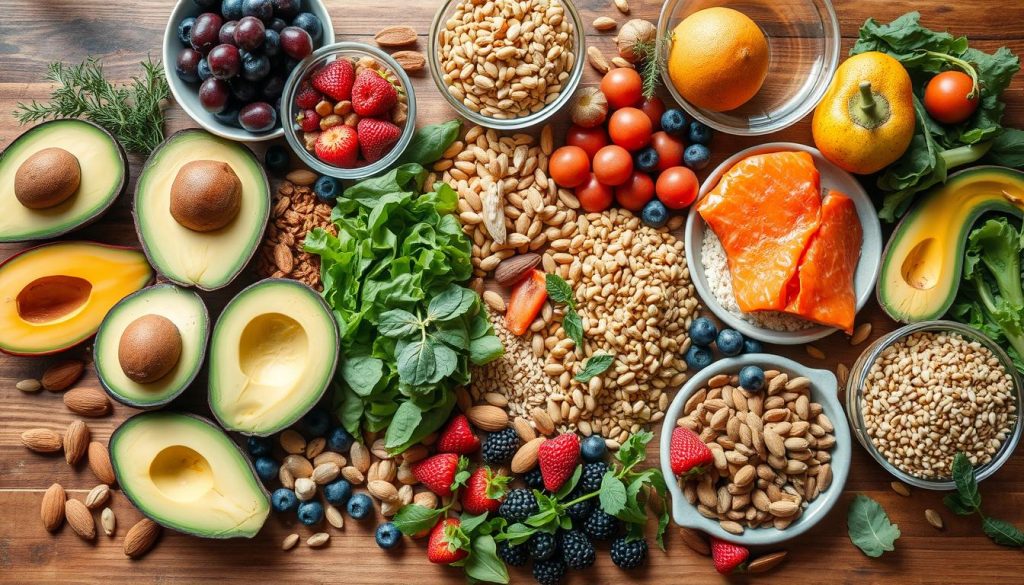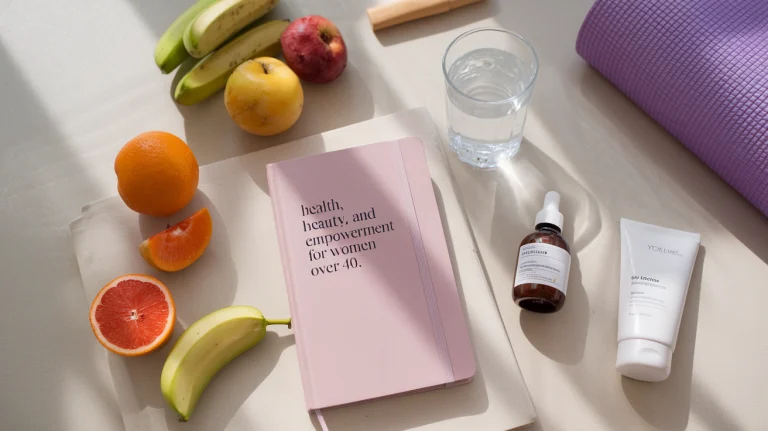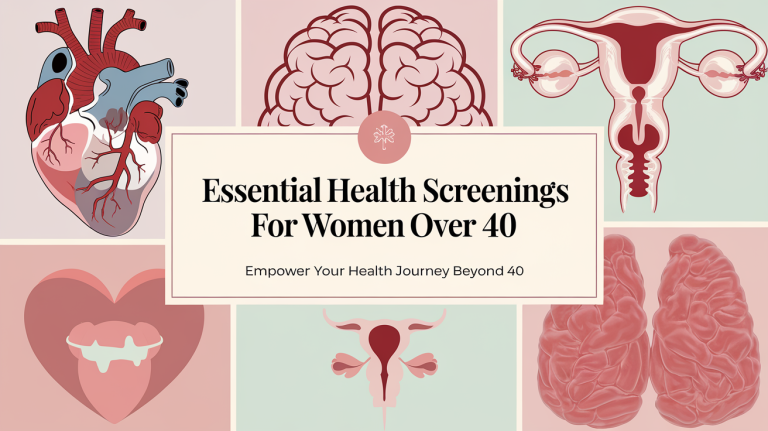Balancing Hormones Naturally: My Top Remedies
This page may contains affiliate links. We may earn a commission for purchases made at no additional cost to you. The content on this website was created with the help of AI.
In my quest for well-being, I found out how important hormonal balance is. Hormonal imbalances can affect our mood and how our body works. Luckily, natural ways to balance hormones can make a big difference.
By eating the right foods and making lifestyle changes, we can get our hormones back in balance. This helps our body work better and feel better too.
I want to share ways to balance hormones naturally. We’ll look at diet, exercise, and managing stress. I hope my experiences will help you improve your hormonal health and quality of life.
Understanding Hormonal Imbalances
It’s important to know about hormonal imbalances for good health. These happen when there’s too much or too little hormone in the body. Stress, bad diet, not enough exercise, and some health issues can cause this.
Aging and toxins in the environment also play big roles. The endocrine system, with glands like the thyroid and adrenal glands, controls many body functions through hormones. Knowing this system helps spot symptoms of hormonal imbalances.
Common signs include feeling tired, mood swings, weight changes, and trouble sleeping. These symptoms can really affect how we live our daily lives.

Ignoring hormonal imbalances can lead to serious health problems. These include infertility, osteoporosis, diabetes, and some cancers. To treat these, doctors use hormone replacement therapy (HRT) and changes in lifestyle.
By eating well, managing stress, and staying active, we can prevent hormonal imbalances. These actions help our physical health and make us feel better emotionally.
Symptoms of Hormonal Imbalances
Knowing the signs of hormone imbalance is key to staying healthy. Our bodies have over 50 hormones that help us function. Spotting these signs early can help catch problems before they get worse.
Common signs to look out for
Many symptoms point to hormone issues. Here are some common ones I see:
- Unexplained weight changes – This can include both weight gain and loss, often due to thyroid or sex hormone issues.
- Fatigue – Persistent tiredness can stem from various hormonal disruptions.
- Digestive issues – Conditions like constipation or diarrhea may arise from hormonal changes.
- Sleep disturbances – Difficulty sleeping may relate to imbalances, affecting daily life.
- Mood swings – Anxiety and mood fluctuations can result from stress on the endocrine system.
The impact of hormonal imbalances on daily life
Hormone imbalance symptoms can really disrupt my daily life. For those assigned female at birth, issues like acne, heavy periods, and infertility may occur. Those assigned male at birth might notice symptoms such as loss of body hair or erectile dysfunction. These symptoms can cause anxiety and lower the quality of life.

Also, chronic conditions from hormonal imbalances can come from stress, puberty, and lifestyle choices. Catching and treating these symptoms early can help manage health better.
Importance of Diet in Hormone Regulation
Eating a balanced diet is key to keeping hormones in check. Our bodies have over 200 hormones, each playing a role in things like hunger, weight, and mood. To improve hormone balance, I make sure to eat foods that help hormones stay healthy.
Foods high in healthy fats, proteins, and fibers are great for hormone health. For example, avocados are tasty and full of beta-sitosterol, which helps control cortisol levels. High cortisol can cause inflammation and health problems.

Cruciferous veggies like broccoli and kale help the liver break down estrogen. This is important for women’s hormone balance. Omega-3s in salmon and walnuts also help control hunger hormones. Foods high in fiber help remove excess hormones from the body.
But, I also know what to avoid. Foods like processed snacks, added sugars, and too much alcohol can mess with hormone balance. I limit my caffeine and alcohol to keep cortisol levels stable. Drinking no more than 14 units of alcohol a week and sticking to two cups of coffee daily helps my hormones stay in balance.
A diet focused on hormone balance improves both physical and mental health. By choosing the right foods, I support my body’s hormone systems and live a healthier life.
A balanced diet is essential for hormone regulation. Eating hormone-friendly foods supports proper hormone production, reduces inflammation, and improves overall health. To enhance your diet, here are some useful resources and supplements.
A hormone-friendly cookbook can provide you with recipe ideas designed to promote hormonal balance through whole, nutrient-rich foods.
For additional support, omega-3 fish oil supplements are a great way to reduce inflammation and improve hormone function.
Natural Remedies for Hormone Balance
Finding natural ways to balance hormones is key for good health. Eating a balanced diet helps regulate hormones. I add specific foods and supplements to my diet to keep my hormones in check. This helps my body function naturally.
Top foods for hormone balance
Some foods are great for hormone balance. Here are a few:
- Fatty fish, like salmon, are full of omega-3s. These are good for hormone production and fighting inflammation.
- Avocados are full of healthy fats. They also help with weight management when hormones are changing.
- Dark leafy greens and seeds have magnesium. This is important for thyroid hormone balance.
- Dark chocolate has antioxidants and prebiotic fiber. It’s good for gut health.
- Cruciferous vegetables help manage estrogen levels well.
Supplements to consider
When food isn’t enough, I look at supplements. Here are some good ones:
- Vitamin D is like a hormone and is crucial. Yet, 41% of Americans lack it.
- B vitamins are important for different functions. Foods rich in them can help with hormonal symptoms.
- A good probiotic helps balance gut bacteria. This supports stress and hormone regulation.
- Natural options like black cohosh and evening primrose oil are popular. But their effectiveness varies.

Exercise and Hormonal Health
Regular physical activity is key for hormone balance. Doing exercise for hormone balance like strength training and cardio helps. It makes your body more sensitive to hormones and helps control insulin levels.
Exercise also gets the adrenal glands working. They release hormones like Epinephrine and Norepinephrine. These hormones help break down fat.
Regular exercise is vital for improving hormone sensitivity and maintaining hormonal balance. Incorporating both strength training and cardio can boost hormones like testosterone, serotonin, and growth hormone.
A resistance bands set can be an effective tool for strength training, allowing you to target key muscle groups without heavy equipment.
To stay motivated and track your progress, a fitness tracker watch provides real-time insights on your activity levels, heart rate, and sleep quality.

It’s important to mix up your workouts for better sports and hormonal health. High-intensity training and resistance workouts boost testosterone. This hormone is vital for muscle growth, fat burning, and energy.
After intense workouts, human growth hormone levels go up. This helps with fat loss and recovery.
Cardio, like speed walking and running, boosts dopamine and serotonin. This improves your mood and helps you sleep better. Regular exercise also balances hormones like cortisol, progesterone, and estrogen.
This is especially good for women going through menopause. It can help raise estrogen levels.
But, too much exercise can harm women’s fertility by lowering progesterone levels. A healthy lifestyle, with diet and exercise, helps manage hormonal imbalances and keeps weight in check.
Combining a balanced exercise routine with a healthy diet helps regulate hormones. This improves your overall health. Exercise is a strong base for achieving and keeping good hormonal health.
Stress Management Techniques
Managing stress is key to hormone balance. Chronic stress can raise cortisol levels, causing health problems. I look into stress-reducing techniques to lower cortisol and balance the body.
Yoga and meditation for reducing stress
Yoga and meditation have changed my life. They help me relax and focus, lowering cortisol. Yoga boosts flexibility and calmness. Meditation lets me reflect and release stress.
Research shows regular practice can lower stress hormones. It’s crucial for managing stress and hormone balance.
The role of music in relaxing the mind
Music’s calming effect is often overlooked. Listening to soft tunes can reduce stress. Studies show it lowers blood pressure and heart rate, promoting calm.
Creating a soothing playlist helps me relax after a busy day. It creates a peaceful space. This practice has improved my well-being and stress management.

Sleep’s Role in Hormone Balance
Quality sleep is key for a healthy hormonal system. I’ve seen how my energy changes with sleep. Studies show sleep’s role in hormone balance, like cortisol, leptin, and ghrelin.
Not getting enough sleep can change how our body works. During sleep, leptin, which controls hunger, is higher. Ghrelin, the hunger hormone, is lower after eating. This balance helps control our appetite. When I don’t sleep well, I get hungrier because of these changes.
Sleep is also when our body releases growth hormone. I love those deep sleep moments for recovery and hormone release. Without enough sleep, my health and metabolism suffer.
To improve my sleep, I avoid blue light before bed and have a relaxing bedtime routine. These steps help my body adjust to the night. Better sleep patterns help balance hormones, improving glucose and insulin sensitivity for better health.
Chronic stress is a significant cause of hormonal imbalance due to elevated cortisol levels. By adopting stress-relief practices, you can help stabilize your hormones and promote emotional well-being.
The Sleepy Meditation app offers guided relaxation sessions to help reduce stress and improve sleep, making it a powerful tool for balancing cortisol.
For quick stress relief throughout the day, a stress-relief essential oil roller can provide calming aromatherapy on the go.
Hydration: The Overlooked Factor
In my quest for hormone balance, I often missed the importance of water. Water plays a key role in hormone regulation. It helps keep our body’s functions running smoothly and ensures hormones are distributed correctly.
Signs of dehydration include dark urine, dry mouth, and headaches. These symptoms show we need more water. Even a little dehydration can hurt our memory and focus, affecting our hormones.
Drinking enough water also makes us look good. It keeps our skin, hair, and nails healthy. When we exercise, drinking water before, during, and after is crucial for muscle health and recovery.
- Water is essential for peak physical performance.
- It prevents muscle cramps and supports endurance.
- Hydration enhances mental alertness and reduces fatigue.
Water makes up a lot of our body, especially in babies and the elderly. In the U.S., 22% of our water comes from food. But, how much we need changes, especially when we exercise. Talking to a fitness expert can help us stay hydrated right.
Research shows we need to understand how water works in our bodies. Our kidneys play a big role in keeping fluids balanced. By drinking enough water, we support our hormones and health.
Holistic Approaches to Hormone Balance
In my quest for holistic hormone balance, I learned the value of combining different health practices. These practices add to traditional methods and boost overall health. A holistic view not only helps with hormone health but also improves life quality.
Integrative practices for better health
Integrative health practices can greatly improve hormonal balance. Here are some effective methods I found:
- Acupuncture: This ancient Chinese medicine may improve hormone function by fixing energy paths and boosting blood flow.
- Chiropractic care: Spinal alignment can enhance body function, possibly helping with hormone production and control.
- Herbal medicine: Herbs like ashwagandha and black cohosh can help with hormonal swings and symptoms of imbalance.
Adding these practices to my daily life improved my hormonal health approach. I suggest trying these options for holistic hormone balance and integrative health. They offer tailored solutions for your specific hormonal needs.
Herbs that Support Hormone Health
Looking for natural ways to balance hormones can really help your health. I’ve found some herbs that are great for hormone balance. They help regulate hormones and ease symptoms.
Top hormone balance herbs to try
- Ashwagandha: This adaptogen boosts libido and balances hormones in both men and women.
- Vitex (Chasteberry): Studies show it helps with PMS and PMDD, and regularizes the menstrual cycle.
- Black Cohosh: It’s good for menopausal symptoms like hot flashes, but be careful of side effects.
- Evening Primrose Oil: It helps with pre-menstrual issues and supports hormonal health.
- DIM (3,3′-Diindolylmethane): Found in veggies like broccoli, DIM helps balance estrogen.
- Rhodiola: This herb helps with fertility issues caused by stress or minor hormonal problems.
- Saw Palmetto: It boosts sperm count and libido, great for men’s health.
How to incorporate them into your diet
Adding these herbs to your diet is easy and fun. Here are some ideas:
- Try teas with herbs like ashwagandha or black cohosh for a calming daily habit.
- Take vitex or DIM supplements, but always check with a doctor first.
- Eat more cruciferous vegetables like broccoli and Brussels sprouts for DIM.
- Use evening primrose oil capsules during your period for comfort.
- Try herb-infused oils or dressings to add flavor and health to your food.
Herbs and natural supplements can support hormone balance by regulating stress hormones, reproductive hormones, and overall endocrine function. Adaptogens and estrogen-balancing herbs are particularly helpful.
Ashwagandha capsules are an excellent option for reducing cortisol and improving stress resilience, helping you maintain balanced hormone levels.
For those seeking menstrual health support, a chasteberry supplement can help regulate estrogen and alleviate symptoms of hormonal imbalance.
Maintaining a Healthy Weight
Keeping a healthy weight is key to balancing hormones. Being overweight can cause insulin resistance. This makes it hard for cells to use insulin, leading to high blood sugar.
Regular exercise boosts insulin sensitivity. Adding moderate exercise to my day helps keep my weight in check. It also helps with hormonal health. Eating low glycemic carbs and getting enough sleep also improves insulin use.
Leptin, the fullness hormone, works less well in obese people, causing them to eat too much. Exercise helps lower leptin levels. Ghrelin, the hunger hormone, may be higher in obese people, making them hungrier. Eating regularly and sleeping well helps manage ghrelin.
High cortisol levels, from stress and poor sleep, can harm health. I try to sleep well, stay active, and eat a balanced diet. This helps control cortisol. Estrogen levels also affect weight and fat distribution. So, managing weight and exercising regularly is crucial for healthy estrogen levels and disease prevention.
Drinking enough water is also important for hormone balance. I drink at least 64 ounces of water a day. This helps my body work well and supports my goal of a healthy weight and hormones. Eating fiber-rich foods also helps with weight management and hormonal health.
The Impact of Alcohol on Hormones
It’s important to know how alcohol affects hormones for our health. Drinking alcohol can change how our body makes, uses, and gets rid of hormones. This can cause health problems and affect how our organs work.
Studies show that drinking too much alcohol can lead to heart disease, metabolic issues, and some cancers. The impact on hormone balance is especially concerning. Women, for example, get drunk faster because they have less alcohol dehydrogenase. This can lead to more hormonal imbalances.
I suggest being careful about how much alcohol you drink. Drinking more than seven drinks a week or three a day can lead to alcohol use disorder. Drinking water after each alcoholic drink can help. Also, eating foods rich in vitamins B and C, like fruit juices, can help your body recover and balance hormones.
Drinking too much can make menopause symptoms worse, like anxiety and fatigue. If you’re struggling with alcohol, check your nutrition and talk to a hormone expert for advice.
But, drinking in moderation, especially red wine, might have some good effects. It could lower heart disease risk. Finding the right balance is key to keeping hormones healthy.
Cutting out Processed Foods
Diet plays a big role in hormone balance. I found that avoiding processed foods greatly improved my health. These foods often have refined carbs and sugars that harm hormone balance.
The effects of processed carbohydrates
Processed carbs like white bread and sugary cereals can cause *insulin resistance*. This is linked to hormonal issues. I changed my diet to include healthier options. Here are some good swaps I made:
- Whole grains: Foods like quinoa and brown rice help keep blood sugar steady and insulin levels right.
- Root vegetables: Sweet potatoes and butternut squash are full of beta carotene, which is good for the thyroid.
- Healthy fats: Adding fatty fish like salmon and sardines gives me omega-3s, important for hormone production.
- Fermented foods: Foods with probiotics, like yogurt or sauerkraut, help my gut health, which is key for hormones.
By avoiding processed foods and choosing whole foods, I’ve seen big changes in my hormonal health. I recommend focusing on natural ingredients in your cooking. It helps with weight management and supports hormone balance on your health journey.
Benefits of Fiber and Gut Health
Fiber is key for a healthy gut and hormone balance. It affects our microbiome, which has trillions of cells. These cells help produce hormones and keep us healthy. Eating foods high in fiber has helped my body balance hormones better.
Soluble fiber dissolves in water, and insoluble fiber doesn’t. Both are good for our gut and hormones. Soluble fiber lowers bad cholesterol and controls blood sugar. Insoluble fiber helps us go to the bathroom regularly.
I eat beans, oats, and flaxseeds for their soluble fiber. These foods help manage insulin levels, which is good for hormone balance.
Fiber is not just for digestion; it also shapes our microbiome. Fermentable fiber feeds probiotics, creating a healthy gut. This is crucial for hormone function. Including resistant starch can lower insulin resistance, showing fiber’s big role in health.
The National Academy of Medicine suggests a certain amount of fiber daily, based on age and gender. This highlights fiber’s role in our diets.
High-fiber diets also lower the risk of constipation, diverticulitis, and colorectal cancer. Knowing how fiber affects hormone balance and gut health helps me choose better foods for my hormones.
How to Evaluate Your Hormonal Health
Checking hormone levels is key to knowing how well you’re doing. I start by watching for signs that might show a hormonal problem. These signs can be different for everyone and might include changes in weight, feeling tired, or mood swings.
For those assigned female at birth, issues like irregular periods or acne could be a sign. Men assigned male at birth might notice changes in their sex drive or muscle strength. It’s important to pay attention to these signs.
If I think I might have a hormonal issue, I see my healthcare provider. They might do blood tests or ultrasounds to check hormone levels. There are also at-home tests for things like menopause or cortisol levels. Knowing these results helps me take care of my health.
But it’s not just about tests. How we live our lives also affects our hormones. Managing stress, eating well, and exercising regularly helps keep hormones in balance. With the right signs and professional advice, I can work towards better hormonal health.
Consulting with Healthcare Professionals
Seeking professional help is key when dealing with hormone health issues. A hormone health consultation can spot underlying problems and create a treatment plan just for you. Doctors, like endocrinologists and naturopathic doctors, are crucial in diagnosing issues like thyroid problems and hormone imbalances.
They help you understand the real causes of your hormonal issues. This way, you’re not just treating symptoms but also the root problems.
Working with healthcare for hormone balance is also important. It lets you monitor and adjust treatments, like Natural Hormone Replacement Therapy (NHRT). This tailored approach can lead to fewer side effects and better symptom relief.
Regular check-ups help you track your progress and make smart health choices. This ensures you’re on the right path to better health.
Adding lifestyle changes and dietary plans to your treatment can boost your hormone balance efforts. Working with healthcare experts means you’re taking a holistic approach to your health. Remember, your health journey is unique. Partnering with experts is a big step towards better health.












